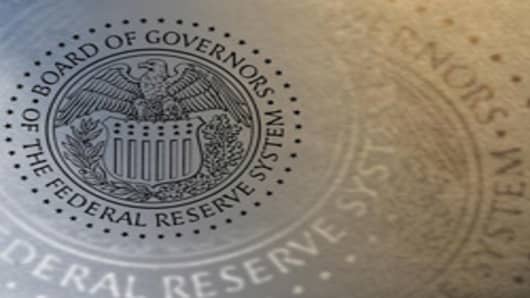Dallas Fed President Richard Fisher and Minneapolis Fed President Gary Stern, both voting members of the FOMC in 2008, said they are keeping a close eye on the level of inflation expectations being dialed into financial markets.
"If inflationary developments and, more important, inflation expectations, continue to worsen, I would expect a change of course in monetary policy to occur sooner rather than later, Fisher said in San Francisco.
Rate increases could be made "even in the face of an anemic economic scenario," Fisher told the Commonwealth Club of California.
Earlier, Stern vowed that the Fed would act in an "appropriate and timely" way. "The key to maintaining low inflation and inflation expectations is likely to be the timeliness and magnitude of decisions we make to reverse course" on interest rates, Stern told a local business group in Altoona, Wisconsin.
So Far So Good?
The Fed monitors inflation expectations as a test of what assumptions are priced into markets and, by implication, consumer behavior.
Central bank officials have expressed concern recently that the United States faces a hint of stagflation, the damaging combination of weak growth and wage-price spiral that hit the economy in the late 1970s and early 1980s, also at a time of rapidly rising oil prices.
Janet Yellen, the president of the San Francisco Fed and typically one of the central bank's more dovish members who focuses more on the need to spur economic growth, said on Tuesday that Fed policy must be the "barrier" to a recurrence of 1970s-style problems.
Stern suggested the Fed has been successful to date. "Inflation expectations have remained reasonably well anchored so far, which is encouraging," he said.
Headline inflation, which includes food and energy prices, "is clearly to rapid for comfort," he said, adding that core measures "have been better behaved."
The Fed lowered its benchmark federal funds rate to 2 percent in April, the seventh in a string of rate cuts started in mid-September, when the fed funds rate was at 5.25 percent, to shield the United States economy from a housing and credit crisis.
Fisher has been one of the Fed's most vocal policy hawks this year, urging a greater focus on quelling inflation, which on Wednesday he termed "a sinister beast" and the "enemy of capitalism."
He has tallied three straight dissents against the FOMC'S decisions to lower interest rates. "Growth cannot be sustained if markets are undermined by inflation," Fisher said. "Stable prices go hand in hand with achieving sustainable economic growth."
But Stern said the Fed is still walking a policy tightrope given the combination of weak growth and rising inflation pressures, that demands delicate action.
"We are seeing challenges on both sides of that and I think we are simply going to have to navigate the minefield," he said.
In particular, Stern said it was unclear if federal tax rebate checks now being mailed to millions of Americans as part of the Bush Administration's plan to stimulate economic growth, would have an impact beyond one or two quarters.
Some forecasters fear that the United States faces a "double-dip" slowdown, with growth likely to pick up in the next few quarters on the back of the stimulus package, before fading again in late 2008 or early 2009.
Another One Bites The Dust
Separately, the FOMC will lose a voting member with the departure of Frederic Mishkin, whose resignation after less than two years, effective Aug. 31, was announced on Wednesday.
The Fed's usual lineup of seven governors, including the chairman and vice chairman, will dwindle to four because of two other vacancies that have been unfilled for months.
"This will mean the departure of an influential (policy) dove," said David Sloan, analyst at 4CAST Ltd in New York.
Mishkin, seen as an ally to Fed Chairman Ben Bernanke in his support of formal inflation targets, will return to his post as a Columbia University economics professor.
"Rick's contributions to the intellectual underpinnings of monetary policy at the Federal Reserve have been invaluable," Bernanke said in a statement.


